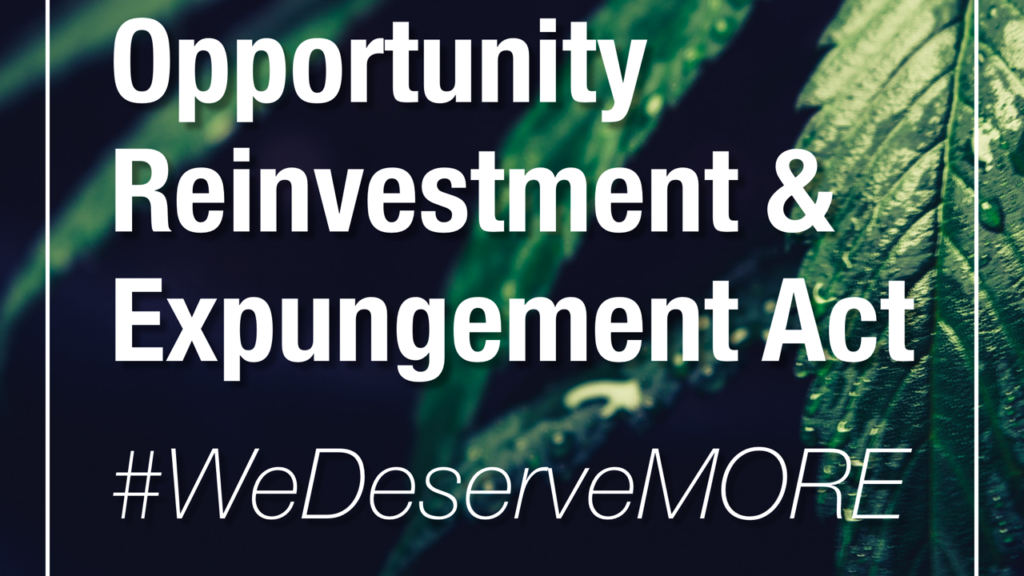The MORE Act, which was introduced to the US Congress last month, would completely decriminalize marijuana at the federal level. How will it work, and what will it do for cannabis consumers, pot convicts, and the burgeoning gray-market industry?
On July 23, Rep. Jarrold Nadler (D-NY) and presidential candidate Kamala Harris (D-CA) introduced the Marijuana Opportunity Reinvestment and Expungement (MORE) Act, which is arguably the most revolutionary and socially conscious federal marijuana reform bill introduced to date.
Previous federal reform bills have, traditionally, died on the Congressional floors before ever getting a vote. Currently, public support for legalizing weed nationwide is at an all-time high: 62 percent of Americans favor legalizing the adult use of marijuana, while over 90 percent want access to medical cannabis. So, what’s taken Congress so damn long to make any changes?
The issue isn’t if marijuana will be legalized anymore. The question is how and when, but America’s elected leaders haven’t agreed on how legalization should be implemented.
The climate of disagreement prompted Nadler to draft his own legislation with input from marijuana organizations like NORML. The MORE Act addresses many of the issues stemming from marijuana prohibition, but it does not offer remedies for every issue. Instead, it takes a somewhat hands-off approach, leaving most regulatory questions up to the states.
Under the MORE Act, marijuana would be completely removed from the Controlled Substances Act, which currently classifies cannabis as a Schedule I drug. Schedule I is the most restrictive category, supposedly reserved only for the most deadly and addictive drugs that have no accepted medical use. With marijuana off federal scheduling, individual states can decide for themselves how they’ll reform their weed laws, if they reform them at all.
Additionally, the MORE Act is the first piece of federal legislation that would establish social equity programs for cannabis entrepreneurs, and it would enact wholesale expungements of prior low-level weed offenses for federal convicts. Convicts currently serving time in federal prisons for cannabis violations would receive reductions to their sentences, too.
On the business end, the MORE Act also sets a 5 percent federal tax on all cannabis sales. That’s it. There is no overly-complex, tiered taxation system that unfairly gouges cannabis consumers and companies, like what those seen in California or Colorado. The excise taxes collected would go toward regulatory oversight, funding expungements and resentencing procedures, and researching how legal cannabis will affect the population at large.
But does the MORE Act have a real chance of passing through Congress? What will happen at the local levels if it does become law? And, most importantly, how will it benefit those most harmed by federal marijuana prohibition, which has disproportionately targeted impoverished communities and communities of color?
To find out the answers to these questions, MERRY JANE called up Justin Strekal, the Political Director at NORML. Strekal has met with Nadler and other members of Congress to help refine the MORE Act’s language, as well as to garner more support for a bill that could finally end America’s century-long war against weed.
“We’re very fortunate to have, in [Rep.] Jarrod Nadler, a judiciary chairman who’s been supportive of marijuana law reform since the 1970s. He says so himself,” Strekal said. “One of the first votes he cast as an elected official in the New York Assembly was to decriminalize the state of New York.”
“Mr. Nadler and the judiciary committee were very thoughtful as they crafted the MORE Act,” Strekal continued. “We believe this is the first comprehensive and workable legislation that has a real shot at passing in a chamber of Congress.”
MERRY JANE: Previous legalization bills in Congress tried to reschedule cannabis, usually by bumping it down to Schedule II or III, alongside drugs like morphine or cocaine. But the MORE Act completely removes weed from federal scheduling. How did the bill’s authors decide on descheduling altogether?
Justin Strekal: It’s important to remember that none of the states that have reformed their cannabis policies — whether medical or adult-use — were predicated on if Congress decides to move marijuana to Schedule II or III or IV. These states have been operating in clear defiance of federal policy, and the only way to protect the existing marketplaces is to outright remove marijuana from the Controlled Substances Act and regulate it as its own substance.
Alcohol is not in the Controlled Substances Act, tobacco is not in the Controlled Substances Act, and McDonald’s is not in the Controlled Substances Act. And the Controlled Substances Act is not a place where cannabis belongs.
The bill contains a section that relabels marijuana and marihuana as cannabis. Is this a move to get rid of the racially-loaded term marijuana from federal legalese?
It’s actually a reestablishment of the legal term [for] cannabis. Through statute, we started calling it marihuana in the 1930s. That was largely contingent on the actions of Harry Anslinger, who changed the conversation and changed the title to marihuana as a way to heavily utilize the racial animus of the time which is, unfortunately, not too dissimilar to today. He weaponized the language against those who consume, and he used marihuana to play on fears related to Mexican immigrants.
What kind of support is the MORE Act getting in Congress right now?
It is a bipartisan bill in the House of Representatives. Right now, we’re in the August recess, so we’re working with who we can to continue to advance the cause. We’ve received three additional co-sponsors since the introduction of the bill, and we plan on signing on a good number more when Congress comes back to session in September.
And it’s important to note, that since the bill is carried by the Judiciary Committee Chairman, it had four different committee chairs on board when the bill was introduced: Rep. Nadler, Chairwoman Nydia Velázquez [of the Small Business Committee], Chairman Jim McGovern of the Rules Committee — which is an incredibly important committee in the process — as well as Chairwoman Maxine Waters of the House Financial Services Committee, which is the only committee in the House, to date, that has successfully marked up a cannabis-related bill.
The MORE Act creates a new federal office, the Cannabis Justice Office. What is this office’s purpose
The Department of Justice has a number of existing offices in their justice programs. This creates another similar office, which would be focused on addressing cannabis-related issues. It’s only logical, since the Department of Justice is an entity that is designed to promote the cause of justice and the rule of law. And since we’re changing the law, and marijuana [possession, cultivation, sales] would no longer be a crime, we must make sure that we’re no longer discriminating against our citizens who are burdened by the criminal records they received under prohibition.
Social equity programs, which prioritize weed business licenses and business loans to pot entrepreneurs who were convicted of cannabis crimes, are laid out in this bill. How will these actually get off the ground, considering that state and local governments are still struggling to get their social equity programs running?
One of the sizable contributing factors to why those programs are struggling to get off the ground are the structural problems that are stemming from federal prohibition in the first place: lack of access to bank accounts, and small businesses’ inability to receive standard tax treatments as every other sector of the economy. Those barriers would no longer be in place after we remove marijuana from the Controlled Substances Act.
This would provide additional revenue to incentivize experimentation and implementation of licensing regimes that acknowledge the harms done under criminalization.
It’s extremely frustrating that, right now, there are very well-intentioned regulators who are trying to fight with one hand tied behind their back, and their other arm is shoulder-strapped to their chest. Federal prohibition is severely hampering these folks to be able to get anything done.
The Minority Cannabis Business Association is the only organization right now doing much in this space, and they’re primed to be in a terrific position to be a leader [for social equity if the MORE Act passes].
The MORE Act contains a section that addresses immigration issues related to cannabis. If the bill removes cannabis from the Controlled Substances Act, why do new immigration policies need to be clarified by law?
Right now, cannabis-related offenses are a significant contributor to deportable offenses. It’s important to make sure that we establish explicit protections for those who are already here. Even if we end federal prohibition, let’s say, hypothetically, in Idaho — which may never reform their state policies [against marijuana] — that a mere possession charge won’t turn into a deportable offense.
Removing marijuana from the Controlled Substances Act doesn’t legalize marijuana in every corner of this country. It simply ends the federal prohibition of marijuana and allows states and localities to set their own [marijuana] policies as they see fit. It’s a choose-your-own-adventure for conservatives or liberals or anyone at any point of the political spectrum to be able to come to that determination — that under our federalist society, cannabis should be locally controlled.
While it would no longer be a federal offense, the violation of local law is something that’s still taken under consideration through federal administration, and that includes immigration.
What kind of complications do you see arising from allowing states or cities to regulate cannabis however they want?
[Sociologist] Max Weber said that the art of politics is the slow boring of hard boards. There is going to be an adjustment phase. As states and local governments identify what practices work best for their communities, and, collectively, as states and localities learn from each other, slowly but surely there will be a consensus that emerges when it comes to regulatory structures, consumer safety and protections, and the like.
Just as alcohol prohibition fell a hundred years ago, there are still dry counties dotting this nation where you cannot buy alcohol. We’ve reached a point where you can buy whiskey in a CVS in Florida, but you can’t legally buy beer at a CVS in a different state.
It’s going to be a process, and as long as that process ends the practice of treating individuals like second-class citizens, and threatening their freedom, simply because they choose to consume marijuana, then we’ll be in a much better position than we are today.
Is there anything else you want people to know about the MORE Act that isn’t explicitly noted in the bill?
Because of the way the tax regime is structured [in the MORE Act], we’re going to be able to provide relief to those who’ve suffered from minor cannabis convictions through expungement. We’re going to be able to grow a new community-centered small-business economy, and we’re going to be able to do it all without spending a nickel of taxpayers’ money.
The chairman [Nadler] was incredibly thoughtful at setting the tax structure up in a way that minimizes the burden on the industry and completely has this all paid for, which is unlike a lot of other proposals that are floating around in Congress. So, if we want to be thoughtful, and if we want to be fiscally responsible, then the MORE Act is the way to go.
Follow Randy Robinson on Twitter and read more of their work at MERRY JANE here




